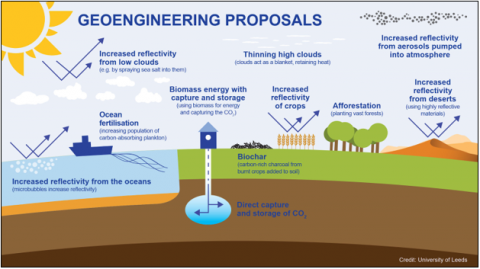

Photo credit: University of Leeds
There has been much talk surrounding the possible use of geoengineering to slow or temporarily stop the rise in global temperatures. However, the effects of implementing such techniques are woefully understudied, especially in developing regions such as the Caribbean. Led by Dr. Leonardo Clarke (Physics), researchers from the Climate Studies Group Mona (CSGM) at The UWI and the Instituto de Meteorología in Cuba are studying the effects of simulated solar geoengineering on the region’s climatology. The first set of results were recently published in Atmosphere. The paper entitled “The Caribbean and 1.5 °C: Is SRM an Option?” is the first of its kind from the region and assesses the possible impact of simulated solar geoengineering on the future climate of the Caribbean.
The study found that solar radiation management (SRM) resulting from the spraying of aerosols such as sulphur dioxide into the upper atmosphere can reduce temperature on the earth’s surface, including in the Caribbean, by reflecting a small amount of incoming sunlight back into space. It can therefore delay the attainment of global warming of1.5oC above pre-industrial levels as advocated for by the Caribbean. The benefit of cooler temperatures will however come with other associated risks, including a reduction in regional rainfall and more episodes of drought, and potential damage to temperature-sensitive aspects of Caribbean life e.g. its biodiversity if solar geoengineering is abruptly discontinued. The authors contend that these findings along with other potential social, political and ethical factors need to be considered if SRM is to be globally deployed.
The research team was led by Dr. Leonardo Clarke (Department of Physics) and included Prof. Michael Taylor and Dr. Tanencia Stephenson, graduate students Matthew Williams and Jayaka Campbell from The UWI, along with Abel Centella-Artola and Arnoldo Bezanilla-Morlot from the Instituto de Meteorología (INSMET) in Cuba.
To read the article: Clarke, L.A.; Taylor, M.A.; Centella-Artola, A.; Williams, M.S.M.; Campbell, J.D.; Bezanilla-Morlot, A.; Stephenson, T.S. The Caribbean and 1.5 °C: Is SRM an Option? Atmosphere 2021, 12, 367. https://doi.org/10.3390/atmos12030367
To learn more about climate research in the Department of Physics: https://www.mona.uwi.edu/physics/research-groups
To learn more about the INSMET: http://www.insmet.cu/
Published on 20 May, 2021